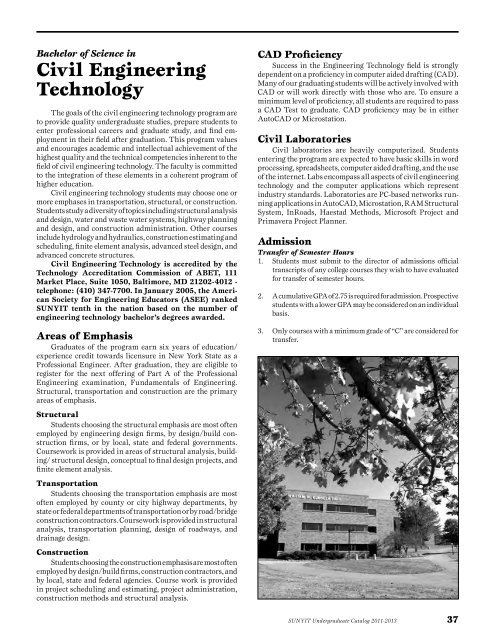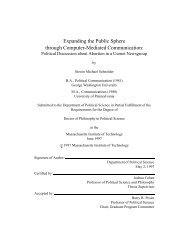Undergraduate Catalog 2011-2013 - SUNY Institute of Technology
Undergraduate Catalog 2011-2013 - SUNY Institute of Technology
Undergraduate Catalog 2011-2013 - SUNY Institute of Technology
You also want an ePaper? Increase the reach of your titles
YUMPU automatically turns print PDFs into web optimized ePapers that Google loves.
Bachelor <strong>of</strong> Science in<br />
Civil Engineering<br />
<strong>Technology</strong><br />
The goals <strong>of</strong> the civil engineering technology program are<br />
to provide quality undergraduate studies, prepare students to<br />
enter pr<strong>of</strong>essional careers and graduate study, and find employment<br />
in their field after graduation. This program values<br />
and encourages academic and intellectual achievement <strong>of</strong> the<br />
highest quality and the technical competencies inherent to the<br />
field <strong>of</strong> civil engineering technology. The faculty is committed<br />
to the integration <strong>of</strong> these elements in a coherent program <strong>of</strong><br />
higher education.<br />
Civil engineering technology students may choose one or<br />
more emphases in transportation, structural, or construction.<br />
Students study a diversity <strong>of</strong> topics including structural analysis<br />
and design, water and waste water systems, highway planning<br />
and design, and construction administration. Other courses<br />
include hydrology and hydraulics, construction estimating and<br />
scheduling, finite element analysis, advanced steel design, and<br />
advanced concrete structures.<br />
Civil Engineering <strong>Technology</strong> is accredited by the<br />
<strong>Technology</strong> Accreditation Commission <strong>of</strong> ABET, 111<br />
Market Place, Suite 1050, Baltimore, MD 21202-4012 -<br />
telephone: (410) 347-7700. In January 2005, the American<br />
Society for Engineering Educators (ASEE) ranked<br />
<strong>SUNY</strong>IT tenth in the nation based on the number <strong>of</strong><br />
engineering technology bachelor’s degrees awarded.<br />
Areas <strong>of</strong> Emphasis<br />
Graduates <strong>of</strong> the program earn six years <strong>of</strong> education/<br />
experience credit towards licensure in New York State as a<br />
Pr<strong>of</strong>essional Engineer. After graduation, they are eligible to<br />
register for the next <strong>of</strong>fering <strong>of</strong> Part A <strong>of</strong> the Pr<strong>of</strong>essional<br />
Engineering examination, Fundamentals <strong>of</strong> Engineering.<br />
Structural, transportation and construction are the primary<br />
areas <strong>of</strong> emphasis.<br />
Structural<br />
Students choosing the structural emphasis are most <strong>of</strong>ten<br />
employed by engineering design firms, by design/build construction<br />
firms, or by local, state and federal governments.<br />
Coursework is provided in areas <strong>of</strong> structural analysis, building/<br />
structural design, conceptual to final design projects, and<br />
finite element analysis.<br />
Transportation<br />
Students choosing the transportation emphasis are most<br />
<strong>of</strong>ten employed by county or city highway departments, by<br />
state or federal departments <strong>of</strong> transportation or by road/bridge<br />
construction contractors. Coursework is provided in structural<br />
analysis, transportation planning, design <strong>of</strong> roadways, and<br />
drainage design.<br />
Construction<br />
Students choosing the construction emphasis are most <strong>of</strong>ten<br />
employed by design/build firms, construction contractors, and<br />
by local, state and federal agencies. Course work is provided<br />
in project scheduling and estimating, project administration,<br />
construction methods and structural analysis.<br />
CAD Pr<strong>of</strong>iciency<br />
Success in the Engineering <strong>Technology</strong> field is strongly<br />
dependent on a pr<strong>of</strong>iciency in computer aided drafting (CAD).<br />
Many <strong>of</strong> our graduating students will be actively involved with<br />
CAD or will work directly with those who are. To ensure a<br />
minimum level <strong>of</strong> pr<strong>of</strong>iciency, all students are required to pass<br />
a CAD Test to graduate. CAD pr<strong>of</strong>iciency may be in either<br />
AutoCAD or Microstation.<br />
Civil Laboratories<br />
Civil laboratories are heavily computerized. Students<br />
entering the program are expected to have basic skills in word<br />
processing, spreadsheets, computer aided drafting, and the use<br />
<strong>of</strong> the internet. Labs encompass all aspects <strong>of</strong> civil engineering<br />
technology and the computer applications which represent<br />
industry standards. Laboratories are PC-based networks running<br />
applications in AutoCAD, Microstation, RAM Structural<br />
System, InRoads, Haestad Methods, Micros<strong>of</strong>t Project and<br />
Primavera Project Planner.<br />
Admission<br />
Transfer <strong>of</strong> Semester Hours<br />
1. Students must submit to the director <strong>of</strong> admissions <strong>of</strong>ficial<br />
transcripts <strong>of</strong> any college courses they wish to have evaluated<br />
for transfer <strong>of</strong> semester hours.<br />
2. A cumulative GPA <strong>of</strong> 2.75 is required for admission. Prospective<br />
students with a lower GPA may be considered on an individual<br />
basis.<br />
3. Only courses with a minimum grade <strong>of</strong> “C” are considered for<br />
transfer.<br />
<strong>SUNY</strong>IT <strong>Undergraduate</strong> <strong>Catalog</strong> <strong>2011</strong>-<strong>2013</strong> 37
















